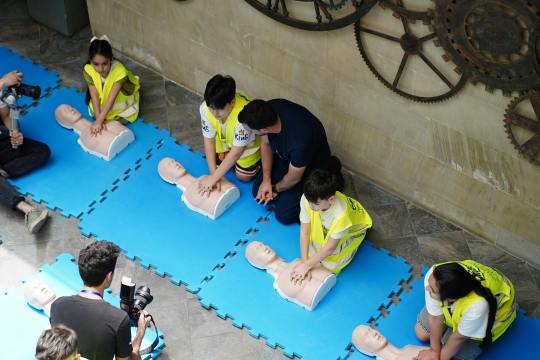#Safeguarding Children Course UK
Explore tagged Tumblr posts
Text
Exploring the Importance of Health and Social Care Courses in the UK

Health and social care is one of the most rewarding and vital sectors in the UK, providing support to individuals who need help due to illness, age, or social challenges. As the population grows and healthcare needs become more complex, the demand for skilled professionals in this field continues to rise. Health and Social Care Courses UK offer an excellent opportunity for those interested in pursuing a meaningful career where they can make a real difference in people’s lives.
Why Choose Health and Social Care Courses in the UK?
The UK has a long-standing reputation for excellence in health and social care training. These courses are designed to equip learners with the necessary skills and knowledge to provide high-quality care, whether in hospitals, care homes, or community settings. Students gain both practical experience and theoretical understanding, enabling them to support individuals’ physical, emotional, and social well-being.
Health and social care is not just about providing medical assistance; it also focuses on improving the overall quality of life for vulnerable individuals. Through Health and Social Care Courses UK, learners can develop interpersonal skills, empathy, and the ability to respond to diverse needs.
Key Skills Gained Through Health and Social Care Courses
Enrolling in a health and social care course allows students to build a strong foundation of skills that are critical in this field. These include:
Communication Skills – Effective communication is essential when working with patients, their families, and other healthcare professionals.
Understanding Health and Safety – Learners are trained to follow strict health and safety protocols to protect both themselves and those they care for.
Problem-Solving Abilities – Health and social care often involve quick decision-making in challenging situations.
Empathy and Compassion – Providing emotional support is just as important as physical care.
Knowledge of Care Standards – Students are introduced to legal and ethical frameworks that govern care practices in the UK.
Who Can Enrol in Health and Social Care Courses UK?
One of the greatest features of these courses is how accessible they are. Whether you are a school leaver, a working professional looking for a career change, or someone already working in the care sector, there is a course suitable for you. Many institutions offer flexible learning options, including online classes and part-time study, making it easier to balance education with other responsibilities.
Career Opportunities in Health and Social Care
Completing Health and Social Care Courses UK opens the door to a wide range of career opportunities. Some potential roles include:
Care worker or support worker
Community healthcare assistant
Residential care home staff
Social worker (with further qualifications)
Health care assistant in hospitals or clinics
Mental health support roles
These roles offer not only job stability but also a sense of fulfilment, as professionals directly impact the lives of those in need.
The Increasing Need for Health and Social Care Workers
The UK healthcare sector is experiencing rapid growth due to factors such as an ageing population, increased life expectancy, and the need for better mental health support. This has created a high demand for well-trained professionals who can provide reliable and compassionate care. Completing Health and Social Care Courses UK ensures that individuals are fully prepared to step into these roles with confidence.
Types of Health and Social Care Courses
There are various levels of courses available to suit different learners and career goals:
Certificate Courses – Ideal for beginners looking to gain an introduction to the field.
Diplomas – More comprehensive, focusing on advanced skills and practical knowledge.
NVQ (National Vocational Qualification) – Work-based qualifications that emphasise hands-on training.
Degree Programs – For those who wish to specialise or advance to senior roles within the sector.
Many of these courses also include practical placements, allowing students to gain real-world experience before entering the workforce.
Benefits of Health and Social Care Courses UK
Job Security: The healthcare sector remains one of the most stable industries in the UK.
Personal Fulfilment: A career in health and social care is highly rewarding, as it involves helping people live better lives.
Career Progression: With additional qualifications and experience, professionals can advance into senior positions.
Transferable Skills: The skills learned in these courses, such as communication and problem-solving, are applicable in many other sectors.
Conclusion
Health and social care is a field that requires dedication, compassion, and the right training. With the rising demand for qualified professionals, enrolling in Health and Social Care Courses UK is an excellent step toward building a meaningful and stable career. These courses not only prepare individuals for the practical aspects of care but also emphasise the values and ethics that are essential in this profession.
Whether you are just starting or looking to enhance your existing skills, these courses provide the knowledge, experience, and confidence needed to succeed in one of the most important sectors in society.
#Health and Social Care Courses UK#Construction Training Programs UK#Health Care Certificate Program UK#Learning Management System in UK#Awareness of Mental Health Disabilities UK#Dementia and Learning Disabilities UK#Basic Life Support UK#NHS and social care sector in the UK#Communication Course UK#Communication Awareness for Healthcare Professionals UK#Duty of Care Course UK#Healthcare and Adult Social Care Course UK#Equality and Diversity course UK#Fluids and Nutrition Course UK#Handling Information Course UK#Health and Safety Course UK#Infection Prevention and Control UK#Privacy and Dignity Course UK#Safeguarding Adults Course UK#Safeguarding Children Course UK#Understand Your Role Course UK#Work in a Person-Centred Way Course UK#Your Personal Development Course UK#Care Skills and Competencies Program UK#Advanced Care Planning Courses in UK#Bladder Care and Management Course UK#Bowel Care and Management Course UK#Care after Death Course UK#Care Planning Training Course UK#Diet and Nutrition Course UK
0 notes
Text
Nutrition and Hydration: How to Stay Energised and Healthy Every Day

In today's fast-moving society, prioritising good health frequently becomes secondary. However, the foundation of a healthy life lies in two simple but essential aspects: nutrition and hydration. These are the building blocks that fuel our body and mind, enhance our well-being, and help us prevent a range of health issues. With increasing awareness of health and wellness, more individuals and organisations across the country are now turning to structured learning programmes like the Nutrition and Hydration Awareness Course in UK to understand better and implement proper dietary practices.
Understanding the Importance of Nutrition and Hydration
Nutrition pertains to the consumption of food, evaluated in connection with the body's nutritional requirements. A well-balanced diet provides all the necessary nutrients — carbohydrates, proteins, fats, vitamins, and minerals — required for the body to function effectively. On the other hand, hydration is about ensuring the body has enough fluids, primarily water, to maintain cellular functions, regulate body temperature, and support metabolism.
When either nutrition or hydration is neglected, it can lead to fatigue, weakened immunity, decreased productivity, and serious health complications over time. For caregivers, health workers, and even individuals managing their health, having a sound understanding of these topics is crucial.
What is a Nutrition and Hydration Awareness Course?
The Nutrition and Hydration Awareness Course in UK is a specially designed training programme aimed at educating participants on the core principles of healthy eating and adequate fluid intake. These courses are often targeted at care workers, support staff, hospitality professionals, and anyone responsible for the dietary well-being of others, although anyone interested in improving their health can benefit greatly.
Typically, these courses cover:
The importance of balanced meals and the recommended daily intake
Nutritional needs of different age groups and those with medical conditions
Signs of malnutrition and dehydration
How to encourage healthy eating and hydration in care environments
Legal and ethical considerations in nutrition and hydration
Safe food preparation and serving practices
Who Should Take the Course?
While the course is highly recommended for individuals working in healthcare, residential care homes, and social services, it’s also valuable for parents, fitness coaches, teachers, and anyone interested in health improvement. In workplaces, ensuring staff complete a Nutrition and Hydration Awareness Course in UK helps foster a culture of health and safety, especially when dealing with vulnerable individuals.
For example, understanding how dehydration affects the elderly or how nutritional deficiencies can impact recovery times in patients can significantly improve the quality of care and outcomes in health settings.
Benefits of Taking a Nutrition and Hydration Awareness Course in UK
1. Improved Health Outcomes
By learning the basics of nutrition and hydration, individuals are better equipped to make informed dietary choices. This leads to improved energy levels, better focus, stronger immunity, and reduced risk of chronic conditions such as diabetes, heart disease, and obesity.
2. Enhanced Professional Development
For care workers and health professionals, completing this course adds value to their qualifications and demonstrates a commitment to high standards of care. It is often considered an essential part of professional development in the health and social care sector in the UK.
3. Promoting Independence and Dignity
Especially in care environments, knowing how to tailor nutritional needs for individuals helps maintain their independence and dignity. It ensures people receive food and drinks that they enjoy and are safe for them, which significantly enhances their quality of life.
4. Reducing Risks and Ensuring Compliance
Poor nutrition and hydration can lead to serious complications, such as infections, falls, pressure ulcers, and hospital admissions. The course helps reduce these risks and ensures organisations comply with UK care standards and regulations.
Practical Applications in Daily Life
Even outside a professional setting, the knowledge gained from a Nutrition and Hydration Awareness Course in UK can be easily applied at home. Meal planning becomes more intentional, portion sizes become more appropriate, and snacking habits become healthier. You also become more conscious about fluid intake — not just relying on tea or coffee, but incorporating water-rich fruits, vegetables, and herbal infusions.
Moreover, parents can use this knowledge to ensure their children are getting balanced meals, while older adults can learn how to maintain muscle mass and energy through proper nutrition and hydration.
Building a Healthier Future
Health literacy is becoming a key focus area in public health, and initiatives like the Nutrition and Hydration Awareness Course in UK play a crucial role in this effort. By empowering individuals with practical and evidence-based knowledge, these courses help bridge the gap between knowledge and action.
Whether you are a healthcare professional, a caregiver, or someone simply wanting to improve your lifestyle, enrolling in such a course is a proactive step towards a healthier future, not just for yourself, but for those you care for.
Conclusion
Nutrition and hydration aren’t just buzzwords; they are the essence of a healthy and fulfilling life. Understanding their impact and learning how to manage them effectively is key to staying energised, sharp, and disease-free. By participating in a Nutrition and Hydration Awareness Course in UK, individuals can gain the tools they need to make lasting positive changes in both personal and professional environments. Health begins with awareness, and this course is an ideal starting point for anyone ready to take control of their well-being.
#Health and Social Care Courses UK#Construction Training Programs UK#Health Care Certificate Program UK#Learning Management System in UK#Awareness of Mental Health Disabilities UK#Dementia and Learning Disabilities UK#Basic Life Support UK#NHS and social care sector in the UK#Communication Course UK#Communication Awareness for Healthcare Professionals UK#Duty of Care Course UK#Healthcare and Adult Social Care Course UK#Equality and Diversity course UK#Fluids and Nutrition Course UK#Handling Information Course UK#Health and Safety Course UK#Infection Prevention and Control UK#Privacy and Dignity Course UK#Safeguarding Adults Course UK#Safeguarding Children Course UK#Understand Your Role Course UK#Work in a Person-Centred Way Course UK#Your Personal Development Course UK#Care Skills and Competencies Program UK#Advanced Care Planning Courses in UK#Bladder Care and Management Course UK#Bowel Care and Management Course UK#Care after Death Course UK#Care Planning Training Course UK#Diet and Nutrition Course UK
0 notes
Text
S. Baum at Erin In The Morning:
According to documents supposedly leaked to The Telegraph—a British tabloid—the National Health Service (NHS) in the United Kingdom “will test all children who believe they are transgender for autism.” “Every child referred to a gender clinic will be ‘screened for neurodevelopmental conditions’ such as autism and ADHD under new guidance,’” The Telegraph reports. “In such cases, the team of doctors will have to determine if the child’s symptoms are caused by autism or whether they also need separate treatment for gender dysphoria.” The NHS did not respond to Erin in the Morning’s request for comment, and Erin in the Morning could not independently verify these claims at this time. So while the policy is not yet set in stone, it wouldn’t come as a surprise. It echoes the policy guidelines set out by the Cass Review, a 2024 document commissioned by NHS England. The Cass Review has been widely rebuked by trans people and experts in the trans healthcare field—none of whom were actually allowed to have any authority in the report’s creation. The Cass Review asserts that this is part of a utilitarian effort to create “holistic” health care for transgender children. In reality, the UK’s proposed mandate on autism and ADHD assessments seems to be another intrusive, needless barrier disguised as “safeguarding,” yet another instance of anti-trans pseudoscience cloaked in the language of “caution.” And it’s part of a growing trend targeting both trans people and autistic people—groups with a statistically significant overlap.
Here’s a brief summary of some things you should know.
Autistic or not, most gender-affirming care is already impossible or near-impossible for minors in the United Kingdom.
Evidence-based best practices in gender health care, such as puberty blockers, are effectively banned for trans people under the age of 18. At this point, puberty has usually already occurred, rendering puberty blockers moot. (However, puberty blockers remain accessible to non-trans youth.) Gender-affirming surgeries are also inaccessible for trans youth. Current NHS guidelines state that starting at age 16, trans youth may access other hormone therapies, such as taking testosterone or estrogen, if they meet “strict criteria.” Their course of treatment must be approved by a clinical psychologist, a child psychotherapist, a child and adolescent psychiatrist, a family therapist, and a social worker. “The team will carry out a detailed assessment, usually over 3 to 6 appointments over a period of several months,” the NHS website says. A trans youth seeking hormone therapy would also have to be seen by a general practitioner and an endocrinologist. If a parent objects to their trans child receiving gender-affirming care, they may also be able to override their child's decision until the child turns 18.
[...]
Neurodivergence has been weaponized by bad-faith and anti-LGBTQ forces to invalidate the existence of transgender people.
Southern Poverty Law Center-designated hate groups have used ADHD, autism, and psychiatric mental health issues to write off all trans youth, framing transness and gender diversity as a mere symptom of neurodivergence that needs to be snuffed out. Alternatively, such talking points falsely imply that all people with ADHD and/or autism have intellectual disabilities so profound that they are unable to assert their gender identity. These groups invoke a deep history of using autism to invalidate gender identity.
[...]
While offering increased access to services and supports for autistic youth can be useful, that’s not the practical effect of this mandate.
Trans kids who are lucky enough to receive a rare placement at a gender clinic are already seen by a litany of mental health care experts; considerations of their mental health and cognitive abilities are already built into existing standards of care for trans people of all ages. Waiting lists for trans-affirming care can already be years-long; adding yet another barrier only serves to forcibly transition queer or gender-questioning youth through a puberty that does not align with their gender, resulting in long-term and potentially irreversible repercussions. The supposed need for these extra hurdles is not supported by evidence. If the UK was really invested in helping neurodivergent people, they could start by providing autism assessments to the record-breaking 172,000 people in the United Kingdom who are already trying—and unable—to get one due to the backlog. Or perhaps the NHS could dedicate resources to the thousands upon thousands of people with ADHD who have been forced off of their medications due to global supply shortages. This comes as similar tensions bubble across the pond in the United States, where just last week, the United States Secretary of Health and Human Services, Robert F. Kennedy, Jr., made sweeping blanket characterizations about autism, declaring that “autism destroys families” and that autistic people will never play baseball, write a poem, or get a job and pay taxes.
More Cass Review insanity in the UK: The UK’s NHS will test trans children to determine if they have “autism” or not.
#Transgender#Anti Trans Extremism#Autism#Neurodivergent#National Health Service#United Kingdom#Studies#Cass Review
6 notes
·
View notes
Note
you are a truly disgusting individual. your anti queer rhetoric is sending the world so far backward, you are pushing hate towards a community who already experiences so much shit from others like you. drag is not dangerous, it is art. being trans is not a cult. queer people are not inherently evil as you so clearly think. you are a sick fuck and I hope you have a terrible day <3
Scotland's Hate Crime Act comes into effect today. Women gain no additional protections, of course, but well-known trans activist Beth Douglas, darling of prominent Scottish politicians, falls within a protected category. Phew! 1/11


Lovely Scottish lass and convicted double rapist Isla Bryson found her true authentic female self shortly before she was due to be sentenced. Misgendering is hate, so respect Isla’s pronouns, please. Love the leggings! 2/11

Fragile flower Katie Dolatowski, 6'5", was rightly sent to a women's prison in Scotland after conviction. This ensured she was protected from violent, predatory men (unlike the 10-year-old girl Katie sexually assaulted in a women's public bathroom.) 3/11

Samantha Norris was cleared of exposing her penis to two 11-year-old girls. Hooray! Unfortunately she was then convicted for possession of 16,000 images of children being raped and sexually assaulted. Be that as it may, Sam’s still a lady to me! 4/11

Scottish woman and butcher Amy George abducted an 11-year-old girl while dressed in female clothing. No idea why this was mentioned in court – of course she was wearing women’s clothing, she's a woman! Amy took the girl home and sexually abused her over a 27-hour period. 5/11

But most women aren’t axe-toters or sex offenders, so let’s talk role models! Guilia Valentino (in red) wanted to play on the women's team 'because of sisterhood, validation and political visibility'. Naturally, she was given some boring cis girl’s place. Yay for inclusion! 6/11

Mridul Wadhwa, head of a Scottish rape crisis centre, says, ‘sexual violence happens to bigoted people as well.’ She has no gender recognition certificate, but was still appointed to a job advertised for women only. Time to be ‘challenged on your prejudices’, rape victims! 7/11

Munroe Bergdorf isn’t just a pretty face! Public campaigner for a children’s charity until safeguarding concerns were raised, she was appointed UN Women’s first ever UK champion. ‘What makes a woman “a woman” has no definitive answer,’ says Munroe. Great choice, UN Women! 8/11

Katie Neeves has been appointed as the UN Women UK delegate. She switched from straight man to lesbian at the age of 48 and, in a leaked 2022 webinar, described how she used to enjoy stealing and wearing her sister’s underwear. A truly relatable representative! 9/11
Image
Last, but least, TV’s India Willoughby proves we women can call a black broadcaster a ‘nasty bitch’ who ‘wouldn’t be anywhere without woke’, dub lesbians men, insult the looks of a female Olympic swimmer, ‘joke’ about kidnapping feminists, and STILL get airtime! What a gal! 10/11

🎉🌼🌸April Fools! 🌸🌼🎉
Only kidding. Obviously, the people mentioned in the above tweets aren't women at all, but men, every last one of them.
In passing the Scottish Hate Crime Act, Scottish lawmakers seem to have placed higher value on the feelings of men performing their idea of femaleness, however misogynistically or opportunistically, than on the rights and freedoms of actual women and girls. The new legislation is wide open to abuse by activists who wish to silence those of us speaking out about the dangers of eliminating women's and girls’ single-sex spaces, the nonsense made of crime data if violent and sexual assaults committed by men are recorded as female crimes, the grotesque unfairness of allowing males to compete in female sports, the injustice of women’s jobs, honours and opportunities being taken by trans-identified men, and the reality and immutability of biological sex.
For several years now, Scottish women have been pressured by their government and members of the police force to deny the evidence of their eyes and ears, repudiate biological facts and embrace a neo-religious concept of gender that is unprovable and untestable. The re-definition of 'woman' to include every man who declares himself one has already had serious consequences for women's and girls’ rights and safety in Scotland, with the strongest impact felt, as ever, by the most vulnerable, including female prisoners and rape survivors.
It is impossible to accurately describe or tackle the reality of violence and sexual violence committed against women and girls, or address the current assault on women’s and girls’ rights, unless we are allowed to call a man a man. Freedom of speech and belief are at an end in Scotland if the accurate description of biological sex is deemed criminal.
I'm currently out of the country, but if what I've written here qualifies as an offence under the terms of the new act, I look forward to being arrested when I return to
the birthplace of the Scottish Enlightenment.
youtube
"It was only in Scotland that the Templars endured no persecution.." Albert G. Mackey
Knights Templars gave birth to the Freemasons.
The Templars practiced Dark Arts and Paganism.
The Templars infiltrated churches including the Church of England.
Reverend is a Masonic title.
Worship of the Pagan Adam Kadmon is worship of Divine Androgyne and Intersex.
The current Transgender Rights For Men and Drag, like the Gender Ideology in Weimer during WWII comes from Pagan worship, very sick elite fetish and Pedophiles. It steps on actual people suffering Body Dysphoria and physical disabilities, involving their organs.
Bottom line: Your 'Art' is FOUL and Fraudulent, meant only to please wealthy perverts and mock real women. Oh! And to allow access to children, for the perverts, you know damn well exist in your community.
#Transgender#Drag Queens#Fuck Freemason Tool Kevin Bacon#Scottish Hate Crime Law Is Anti-Child Safety and Anti-Woman#Women's Rights#Scottish Rite Freemasons#History#Catholic Church#France#Freemasons Include Conservatives and Liberals#Left AND Right#Bohemian Grove#Clarence Thomas#Gay Federalist Society#Black Boule#Hollywood#Propaganda Arm#Gender Affirming Care#Should only ve used for people with real disabilities#LGBTQ
8 notes
·
View notes
Text
So did LQG abuse children?
First of all, this is a joke. The true answer is no, of course not. But this is funny, so let's do it.
This is brought to you by a collection of anecdotal evidence, with varying levels of experience in doing martial arts as a childhood hobby. Please do not take it as legal advice. It will not help you.
Highlight of the conversation:

Contact sports aren't illegal. Martial arts can be practiced by children. This can include both children practicing techniques on each other, and the instructor demonstrating techniques on children. This may cause light injury (scrapes and bruises). This is fine.
More serious injuries in sport do happen (sprains, broken limbs etc. Concussion is far more serious than fiction tells you - if you hit your head, please get medical advice). That being said, any decent sports instructor should have training in practicing sports safely. A karate person pointed out to me that karate has a lot of focus on control, so if you're causing injury in practice, you're doing something wrong, but also said they weren't sure about other martial arts. The only martial arts I've done is MMA very briefly, and I never got to the stage where anyone was capable of causing anyone serious injury, but we were given a briefing on day 1 about not hurting people. (If people are more knowledgeable about this, please chip in!) So LQG sending floods of children to Qian Cao is quite bad. There was, however, lack of consensus as to whether this would be illegal, but whatever the case, you would probably get in trouble for one of the following:
Safeguarding practices
Harassing, threatening, bullying, or intimidating students is absolutely no-go, obviously. (idk what the legalities are though, although it will get you fired from any decent institution.) So LQG's brutish ways leaving students shivering in fear gives him minus points.
Discriminating students for their background, ethnicity, gender, sexual-orientation etc. is also not okay. So more minus points for discriminating against demons.
Safeguarding is serious stuff. Places that work with children (at least in the UK) should have a designated safe guarding lead, to whom which safe guarding concerns can be passed on to. Students should have a way of raising concerns to higher levels (no matter how high up in the organisation the person of concern is, so may involve contacts outside of the organisation.) Cang Qiong Mountain does not seem to have any of this in place (*cough* student-teacher relationship *cough*), or any method of preventing bullying, so even more minus points here.
Endangerment of Children
It turns out it is not okay to endanger children!!! (Can you imagine how many fictional characters need to be arrested?) So no, you can't get kids to shoot guns at each other. This is illegal. Cang Qiong Mountain gets minus points for sending their kids to the Immortal Alliance Conference, or on life-threatening missions.
If it's your responsibility to look after a child, you should (surprisingly enough) look after said child. LQG seems to spend most of his time off the peak, and notably not looking after children. On the other hand, we are aware of other instructors on Bai Zhan peak - Ji Jue makes an appearance in the airplane extras, who is of the same generation as Liu Qingge. So evidently, there are some older people around to take care of the kids when Liu Qingge is off doing whatever. (Which would make sense, because no way is Liu Qingge correcting form and stuff) So we'll give him benefit of the doubt here.
So in summary LQG is (probably) not guilty of child abuse. However, he is definitely guilty of child endangerment. (As well as discrimination, reckless endangerment, arson, assault, hate crimes against demons etc.) Moreover, you could probably sue the whole of Cang Qiong Mountain for being unsafe and neglecting kids. Health and safety man. Gotta take it seriously👍
#svsss#liu qingge#is this anti liu qingge?#if you want me to tag it as such i will#offshoot of a response i am still sitting on
18 notes
·
View notes
Text
Why Using Buccal Training For Epilepsy Is Important?

Understanding Care Mandatory Training
Understanding care training requirements in the UK is essential for all domiciliary carers. Statutory and mandatory courses cover key subjects to ensure staff members and clients remain safe.
Health and safety training courses cover crucial protocols like risk evaluation, manual handling, fire safety, safeguarding training for care workers to detect abuse as well as local reporting procedures, medication administration training is also a necessity for domiciliary care providers.
Online buccal training for epilepsy wrap training
Buccal training for epilepsy (epilepsy medication administration training) assists healthcare professionals and caregivers to provide effective and safe care to individuals experiencing seizures. The training offers valuable skills that can reduce anxiety and stress as well as enhance quality of life for people living with epilepsy.
Effective training also ensures that care workers and nurses know the correct method of administering buccal midazolam to those experiencing seizures, as incorrect administration can cause it not to be absorbed effectively leading to ineffective or delayed seizure treatment. Individuals with expectations to know about wrap training and other details can feel free to visit here.
As it can be challenging to teach how to administer buccal midazolam successfully without human volunteers, this handheld airway trainer makes training simple and straightforward. With its adjustable jaw, teeth, and tongue features, this device serves as an effective demonstration for how to administer drug therapy into cheek during seizure attacks or other emergency situations.
Paediatric first aid online
Paediatric first aid online training is essential for anyone working with children or infants, including nurses, nannies, au pairs, teachers and parents. This course can save lives when injuries such as choking or cardiac arrest occur and will benefit any profession working directly with children - such as teachers. This course may also benefit their own parents!
This online care mandatory training course covers first aid and CPR for infants and children, as well as using an adrenaline auto-injector in case of an allergic reaction. This course is perfect for teachers, childcare providers, camp counselors, school bus drivers and foster parents. Certification lasts for two years and fulfills OSHA regulations.
CPR AED for the child & infant
CPR and AED training is essential for all care workers, particularly when caring for infants who are more prone to sudden cardiac arrest (SCA). According to the pediatric Chain of Survival guidelines, high-quality CPR should begin immediately rather than waiting until either there is a pulse found or breathing resumes.
Before commencing CPR, ensure the area is free of obstructions and dry. Remove any bulky clothing, place the infant on their back, tap their back several times while speaking loudly to see if they respond; if not, call 911/EMS immediately for assistance.
The Heart saver Pediatric First Aid CPR AED course equips participants to recognize and care for illnesses or injuries in children and infants until professional assistance arrives. Based on current resuscitation science and guidance from the American Heart Association, this course also features hands-on skills sessions as well as teaching how to use an AED.
vimeo
Adult & paediatric first aid
Care workers must complete mandatory training. This may include courses to teach them how to care for elderly individuals as well as how to treat children and infants properly.
These courses cover topics such as first aid, basic life support and infection control for carers. Furthermore, these training programs aim to teach them about providing dignity-in-care while honoring the privacy of those they are caring for.
Paediatric first aid courses are often required for individuals working in industries related to children in the UK, such as nursery staff, child-minders and teachers. Paediatric first aid differs from standard first aid in that its focus lies on treating injuries and illnesses that affect infants and children - such as febrile convulsions, head injuries or choking incidents in young children.
1 note
·
View note
Text
Islamic Boarding School Manchester – A Complete Faith-Based Educational Experience
Introduction
Islamic Boarding School Manchester offers a unique opportunity for students to immerse themselves in a learning environment that supports both academic growth and Islamic development. For families seeking such institutions in Manchester, the choices are few but impactful. This blog explores the concept of Islamic boarding schools in Manchester, the benefits they offer, and why they may be a great option for Muslim families in the UK.

What Is an Islamic Boarding School?
An Islamic boarding school is a residential educational institution that provides both secular education and Islamic studies. Students live on campus, follow a structured schedule, and benefit from constant spiritual guidance.
These schools help students develop independence, discipline, and a deeper connection with their faith. They often attract families looking to remove distractions and instil stronger values in their children.
The Need in Manchester
Manchester has a large Muslim population and a growing demand for Islamic schooling. While day schools like KD Grammar and MIGSG meet this demand during the day, some families seek more immersive options that allow their children to live and learn in a controlled, faith-based environment.
Although Islamic boarding schools are more common in places like Leicester and London, efforts to establish or expand boarding facilities in Manchester have grown in recent years.
Benefits of Islamic Boarding Schools
1. Structured Environment: Boarding schools offer fixed prayer times, study periods, and recreational hours. This builds discipline and time-management skills.
2. Round-the-Clock Tarbiyah: Students are consistently exposed to Islamic teachings, good manners (akhlaq), and positive role models.
3. Strong Brotherhood and Sisterhood: Living together fosters strong bonds, teamwork, and a sense of shared purpose. Many alumni develop lifelong friendships.
4. Reduced Distractions: With less access to social media and peer pressure from mainstream schools, students can focus on study and spirituality.
5. Parental Peace of Mind: Knowing that your child is in a safe, nurturing, and Islamic environment provides immense comfort to parents.
Notable Institutions
While Manchester currently lacks a full-scale Islamic boarding school like those in other parts of the UK, some institutions have begun offering residential weekend courses or extended boarding during exam periods. There is also growing support for expanding KD Grammar’s offerings or launching new projects under MIET to meet the demand.
Parental Considerations
Before enrolling a child in a boarding school, it’s crucial to assess readiness. Boarding life requires independence, resilience, and adaptability. Parents should also research curriculum quality, pastoral care systems, and safeguarding policies.
Visits, open days, and reviews from other families can offer valuable insights.
Looking Forward: The Future of Boarding in Manchester
With increasing interest and the success of institutions like KD Grammar and Manchester Islamic Grammar School for Girls, there is significant potential for Islamic boarding schools to be established in the city. Community involvement, funding, and trust-backed initiatives will be key to making this a reality.
Conclusion
Islamic boarding schools offer a unique and enriching path for Muslim students seeking both academic and spiritual growth. While Manchester is still developing its options in this space, the demand is strong and the foundation is being laid. For families seeking a complete educational journey rooted in Islam, the future is promising—and Manchester may soon become home to the next generation of Islamic boarding excellence.
0 notes
Text
Top-Rated Childcare First Aid Level 3 Course in Stratford, London for EYFS and Nursery Staff
When it comes to caring for young children, having the right training can make all the difference in critical situations. Whether you're working in a nursery, preschool, or EYFS setting, being equipped with life-saving skills is not only a legal necessity but also a moral one. That’s why enrolling in a Childcare First Aid Level 3 Course Stratford London is one of the most important steps any childcare professional can take.

In this blog post, we’ll explore why this course is essential, what it covers, and why Stratford, London is the ideal place to get certified.
Why Childcare First Aid Matters
Children, especially infants and toddlers, are naturally curious and full of energy. While this is part of what makes working with them so rewarding, it also increases the chances of accidents happening. From minor bumps and bruises to more serious medical emergencies like choking or allergic reactions, early years staff need to be prepared.
A Level 3 Childcare First Aid qualification is specifically designed to meet the needs of those working in environments where they are responsible for the care of children. It’s a vital part of EYFS statutory requirements in the UK.
Who Needs the Childcare First Aid Level 3 Course?
The course is ideal for:
Nursery workers
Pre-school staff
EYFS teachers and teaching assistants
Nannies and childminders
After-school club and playgroup staff
Anyone looking to work in the childcare sector
Whether you’re new to the field or an experienced childcare professional, having an up-to-date Childcare First Aid Level 3 Course in Stratford London under your belt ensures you're both compliant and confident in your role.
What the Course Covers
The Childcare First Aid Level 3 Course is comprehensive, combining both theoretical knowledge and practical application. Here’s an overview of the modules typically covered:
Paediatric Life Support
Learn how to respond effectively to life-threatening emergencies like cardiac arrest and breathing difficulties in infants and children.
Choking and Airway Management
Hands-on training to clear airways in choking emergencies using age-appropriate techniques.
Anaphylaxis and Allergy Response
Recognize severe allergic reactions and administer auto-injectors such as EpiPens.
Burns, Bleeds, and Fractures
Learn how to treat common childhood injuries like nosebleeds, cuts, sprains, and broken bones.
Managing Childhood Illnesses
Understand symptoms and responses for meningitis, asthma attacks, febrile seizures, and more.
Recording and Reporting
Stay compliant with safeguarding practices by properly documenting incidents and injuries.
The course aligns with Ofsted and EYFS (Early Years Foundation Stage) requirements, making it the perfect certification for those working in regulated settings.
Why Choose Stratford, London for Your Training?
Stratford is not just known for the iconic Queen Elizabeth Olympic Park and bustling Westfield shopping centre; it’s also a hub for high-quality vocational training. Here’s why taking a Childcare First Aid Level 3 Course in Stratford London makes practical and professional sense:
Excellent Transport Links
Stratford is easily accessible via Central Line, Jubilee Line, Overground, and DLR, making your commute to training hassle-free, whether you’re coming from East London or beyond.
Modern Training Facilities
Training centres in Stratford are often equipped with the latest medical mannequins and simulation tools, helping you gain realistic, hands-on experience.
Experienced Instructors
Many courses are led by qualified healthcare professionals with years of field experience, ensuring the highest quality of teaching.
Networking Opportunities
Stratford’s growing professional community offers the chance to meet fellow childcare workers, share experiences, and build connections that can benefit your career.
What to Expect from the Course Format
Most Childcare First Aid Level 3 Courses in Stratford London are delivered over two days and include:
Face-to-face sessions for practical skills assessment
Theory modules taught via presentations, demonstrations, and discussions
Multiple-choice exam and practical assessment for certification
Certification valid for three years
Some providers also offer blended learning, where part of the course can be completed online and the rest in person.
Key Benefits of Certification
Enrolling in a Childcare First Aid Level 3 Course in Stratford London comes with several benefits:
Fully compliant with EYFS statutory framework
Recognised by Ofsted and local authorities
Enhances employability and career growth
Builds confidence in emergency response
Offers peace of mind to parents and guardians
Whether you’re renewing your certification or pursuing it for the first time, the Level 3 course ensures you meet all legal and professional requirements.
How to Choose the Right Training Provider
Here are a few tips for selecting a reliable training provider in Stratford:
Look for Ofqual-regulated qualifications (e.g., awarded by Qualsafe, TQUK, or FAA)
Read reviews from past learners
Confirm that trainers are certified and experienced
Ensure the course meets EYFS and Ofsted criteria
Check for flexibility in course dates and payment options
Final Thoughts
Investing in a Childcare First Aid Level 3 Course in Stratford London is more than just ticking a compliance box—it’s about protecting lives and ensuring every child in your care receives the safest environment possible.
Whether you’re based in Stratford or commuting from nearby areas, enrolling in a reputable course will give you the knowledge, skills, and confidence to respond effectively in any emergency involving children.
Don’t wait for an incident to remind you how essential first aid training is—take the step today and be a safety champion in your childcare setting.
1 note
·
View note
Text
Goldmark Training UK: Professional Training with Purpose

In today’s complex and evolving work environments, training is not just about ticking boxes—it's about creating meaningful change. That’s exactly what Goldmark Training UK offers. With a strong foundation in lived experience and specialist knowledge, Goldmark provides practical, emotionally intelligent training across key areas such as safeguarding, mental health, inclusion, and leadership.
Here’s a detailed look at why Goldmark Training has earned the trust of organisations across the UK and how their approach is redefining workplace development.
Goldmark Training is shaped by frontline expertise
The strength of Goldmark Training lies in its foundation. The company is led by professionals who have not just studied the challenges of safeguarding, mental wellbeing, or inclusion—they’ve lived them. Founder Tahira Hussain brings two decades of experience as a registered psychotherapist and social care practitioner. This real-world background ensures that the training isn’t theoretical—it’s deeply practical and emotionally aware.
When someone with direct experience facilitates the session, learners connect more authentically. They listen differently. That’s the impact of Goldmark’s lived-experience approach: it builds trust, relevance, and confidence.
The training is reflective, not prescriptive
Unlike many training providers that rely on slides and handouts, Goldmark uses a reflective learning model. This means participants are encouraged to examine their own behaviours, attitudes, and reactions—not just absorb information.
Whether it’s a session on unconscious bias, mental health, or safeguarding, the aim is to promote understanding through reflection. This kind of learning tends to stick. It leads to long-term behavioural change because it connects emotionally, not just cognitively.
Organisations that embrace this model report more open team communication, stronger internal accountability, and a more compassionate working culture.
Safeguarding training is in-depth and scenario-based
Safeguarding responsibilities are not always straightforward. That’s why Goldmark Training designs its safeguarding courses around real-life examples, current legislation, and ethical decision-making. Whether you're working with vulnerable children or adults, the training helps learners identify signs of risk, respond appropriately, and document actions with clarity and confidence.
Goldmark aligns its safeguarding content with key UK laws like the Children Act 1989 and Care Act 2014, but focuses just as much on the emotional intelligence needed to make sensitive decisions in the moment. This combination of policy and practice ensures staff are both compliant and capable.
Mental health training focuses on resilience and awareness
Mental health awareness is essential in any modern workplace. But Goldmark takes it further by offering tools grounded in cognitive behavioural therapy (CBT) that help staff understand their own stress responses and those of their colleagues.
These sessions aren’t just about recognising anxiety or depression—they teach how to set boundaries, create psychological safety, and promote resilience across teams. Organisations benefit through lower levels of absenteeism, higher productivity, and more compassionate leadership.
What makes this training particularly effective is that it’s delivered by professionals who have worked in mental health settings. They don’t just teach—they guide, listen, and support.
Unconscious bias and inclusion are addressed honestly
Goldmark understands that conversations about bias and inclusion can feel uncomfortable, especially when they challenge long-held beliefs or workplace habits. That’s why their training is designed to be safe, honest, and engaging—not defensive or confrontational.
Participants are invited to explore their assumptions, reflect on lived experiences, and understand how bias affects decision-making, teamwork, and hiring. The training provides practical strategies to interrupt bias and foster an inclusive environment where everyone can contribute fully.
Organisations often use this training as a foundation for wider inclusion initiatives, from revising recruitment practices to building stronger internal equity policies.
Leadership development is grounded in emotional intelligence
Leadership today requires more than technical skill—it requires empathy, self-awareness, and the ability to adapt under pressure. Goldmark’s leadership courses are built around these principles. Participants learn how to lead with purpose, resolve conflict, motivate teams, and communicate clearly.
These sessions are ideal for new managers as well as experienced leaders who want to improve team dynamics. The training includes role-play, reflective exercises, and real-world problem-solving scenarios, making it highly practical.
The result? Leaders who can inspire, support, and guide their teams more effectively—especially during challenging times.
Training is tailored, flexible, and easy to access
Goldmark offers both in-person and online delivery, allowing organisations to train teams regardless of size or location. Courses can be customised based on sector, job role, and training goals. Whether you’re a local authority needing safeguarding training or a corporate firm wanting wellbeing workshops, Goldmark adapts its content accordingly.
This flexibility is especially useful for organisations with shift patterns, hybrid staff, or remote teams. It ensures training is accessible, relevant, and time-efficient—without compromising quality.
Training outcomes are measurable and lasting
One of the most valuable aspects of Goldmark’s training is that it leads to real results. Clients often report increased staff confidence, stronger safeguarding procedures, and a more inclusive team culture. Evaluation forms frequently show high engagement, and many organisations use follow-up sessions to build on the first round of learning.
For example, after unconscious bias training, a housing association revised its recruitment language and saw a more diverse range of applicants within three months. After a wellbeing workshop, a council department implemented peer support systems and noted reduced stress-related sick days.
This is the kind of change Goldmark helps create—not just awareness, but action.
Goldmark is trusted by the public and private sectors
Goldmark has delivered training for schools, councils, housing providers, health organisations, and charities across the UK. Their ability to work across sectors speaks to the universality of their core mission: building safer, more inclusive, and emotionally intelligent workplaces.
Clients often return for additional sessions or expand their training across departments—an indication of both satisfaction and results.
Final word: Why Goldmark Training is a smart choice
If your organisation is ready to go beyond basic training and invest in meaningful professional development, Goldmark Training UK is a partner you can trust. With a focus on real-world relevance, emotional insight, and ethical leadership, Goldmark helps teams not just perform better—but work with greater confidence, care, and purpose.
Explore their programmes or book a consultation at www.goldmarktraining.co.uk
0 notes
Text
How County Lines Impacts Safeguarding in the UK
County Lines is a term used to describe the criminal exploitation of children and vulnerable adults by gangs and organised crime networks. These individuals are coerced into transporting drugs and money across different areas of the UK, often using dedicated mobile phone lines, hence the term "county lines".

Understanding County Lines
County lines operations involve:
Exploitation of young people: Children as young as 11 are targeted and manipulated into criminal activities.
Use of dedicated phone lines: Gangs use specific mobile numbers to coordinate drug distribution.
Transportation across regions: Drugs are moved from urban centres to rural and coastal areas.
The Safeguarding Perspective
From a safeguarding standpoint, county lines is a serious concern:
Child Criminal Exploitation (CCE): Victims are often treated as criminals rather than individuals in need of protection.
Modern Slavery: The coercion and control exerted over victims align with definitions of modern slavery.
Cuckooing: Gangs take over the homes of vulnerable individuals to use as drug distribution bases.
Recognising the Signs
It's crucial for professionals and the public to identify potential indicators of county lines involvement:
Unexplained absences: Frequent missing episodes from school or home.
Sudden wealth: Possession of expensive items without clear means.
Changes in behaviour: Increased secrecy or aggression.
New relationships: Association with older individuals or gang-affiliated peers.
The Role of Training
Education is vital in combating county lines exploitation. Comprehensive training equips individuals with the knowledge to:
Identify warning signs: Recognise behavioural and physical indicators.
Respond appropriately: Take the necessary steps to safeguard potential victims.
Understand legal obligations: Comprehend the responsibilities under UK safeguarding laws.
For an in-depth understanding, consider enrolling in our Safeguarding Children Level 3 Course. This course offers comprehensive insights into safeguarding practices and legal frameworks.
Further Reading
To explore more about county lines and safeguarding, visit our detailed blog post: What Is County Lines in Safeguarding?.
#CountyLines#Safeguarding#ChildProtection#YouthSafety#VulnerableYouth#CommunityAwareness#PreventExploitation#SupportOurYouth#careskillstraining
0 notes
Text
Unlocking a Rewarding Future with Health and Social Care Courses in the UK

The demand for compassionate, skilled, and knowledgeable professionals in the health and social care sector has never been higher. With an ageing population, evolving health challenges, and increased focus on mental wellbeing, the UK’s healthcare system continues to seek individuals who are passionate about making a difference. This growing demand presents a valuable opportunity for those interested in pursuing Health and Social Care Courses in the UK.
These courses are more than just academic qualifications; they provide essential knowledge, practical experience, and personal growth that prepare individuals for impactful careers. Whether you're a school leaver, a career changer, or someone looking to advance in the care sector, exploring health and social care education could be the beginning of a deeply fulfilling journey.
Why Choose Health and Social Care Courses in the UK?
The UK is internationally recognised for its structured and comprehensive education system, particularly in the field of healthcare and social support. By enrolling in Health and Social Care Courses in the UK, students gain access to a curriculum that combines theoretical foundations with real-world experience. This dual approach ensures that learners are well-prepared to meet the needs of individuals, families, and communities with professionalism and empathy.
Here are several convincing reasons to explore this option:
Growing Sector: Health and social care is one of the fastest-growing employment sectors in the UK. The National Health Service (NHS), local councils, and private care providers are continually hiring trained professionals to meet increasing service demands.
Diverse Career Opportunities: These courses open the door to a variety of roles, including care worker, support worker, healthcare assistant, social worker, mental health support specialist, and more. With further education and experience, you could move into management or specialist positions.
Job Stability and Security: Careers in health and social care offer long-term job security. With ongoing workforce shortages, those with relevant qualifications are often in high demand.
Personal Fulfilment: Few careers provide the level of personal satisfaction that comes from directly improving someone’s quality of life. Helping others through challenges and empowering them to live independently is highly rewarding.
Categories of Health and Social Care Programs in the UK
Whether you prefer classroom learning, online study, or hands-on training, there is a wide range of Health and Social Care Courses in the UK tailored to different needs and career stages.
1. Level 2 and 3 Diplomas
These qualifications are ideal for beginners who are just entering the field. They focus on essential knowledge, such as communication, safeguarding, equality and diversity, and person-centred care. These courses typically include practical placements in care settings.
2. Foundation Degrees and Undergraduate Courses
For those seeking a more in-depth understanding, foundation degrees or full undergraduate programs provide a balance of theory and practice. These qualifications often include modules on psychology, sociology, public health, and ethics in care, giving a holistic view of the sector.
3. Postgraduate and Professional Development Courses
Already working in the field? Continuing professional development (CPD) and postgraduate study can help advance your career. These courses are designed to deepen your expertise in areas such as mental health, child protection, or leadership in social care.
4. Online and Part-Time Learning
Many institutions now offer flexible learning options. Online and part-time Health and Social Care Courses in the UK are ideal for those balancing study with work or family commitments. These courses provide the same quality education while offering the convenience of remote access.
What Will You Learn?
The content of health and social care courses varies depending on the level and specialisation, but most programs will cover:
Human Growth and Development: Understanding life stages and the physical, emotional, and psychological changes people experience.
Health and Safety in Care Settings: Learning how to ensure a safe environment for both care recipients and providers.
Safeguarding and Protection: Recognising signs of abuse or neglect and understanding the legal responsibilities of care workers.
Communication and Interpersonal Skills: Developing techniques to effectively support clients from all walks of life.
Legal and Ethical Principles: Exploring the moral and legal obligations involved in care provision.
Career Progression and Opportunities
Graduating from one of the Health and Social Care Courses in the UK opens a variety of doors. Here are a few potential career paths:
Support Worker: Assist individuals with daily living tasks and promote independence.
Healthcare Assistant: Works under the guidance of nurses and doctors in hospitals or community settings.
Social Worker: Help individuals and families cope with challenges such as poverty, illness, or disability.
Mental Health Worker: Support people dealing with mental health issues through counselling and care planning.
Community Outreach Coordinator: Work with local organisations to deliver healthcare education and support programs.
With further education, one can progress to roles such as care home manager, clinical supervisor, or pursue nursing, midwifery, or occupational therapy degrees.
Final Thoughts
In today’s world, where health and wellbeing are paramount, choosing a career in health and social care means contributing to a vital part of society. By enrolling in Health and Social Care Courses in the UK, you’ll gain the skills, knowledge, and confidence to impact lives and build a stable, meaningful career.
Whether you’re just starting or looking to take your current role to the next level, there’s a course out there to support your goals. Explore your options today, and take the first step toward a rewarding future in health and social care.
#Health and Social Care Courses in UK#Health and Social Care Courses UK#Construction Training Programs UK#Health Care Certificate Program UK#Learning Management System in UK#Awareness of Mental Health Disabilities UK#Dementia and Learning Disabilities UK#Basic Life Support UK#NHS and social care sector in the UK#Communication Course UK#Communication Awareness for Healthcare Professionals UK#Duty of Care Course UK#Healthcare and Adult Social Care Course UK#Equality and Diversity course UK#Fluids and Nutrition Course UK#Handling Information Course UK#Health and Safety Course UK#Infection Prevention and Control UK#Privacy and Dignity Course UK#Safeguarding Adults Course UK#Safeguarding Children Course UK#Understand Your Role Course UK#Work in a Person-Centred Way Course UK#Your Personal Development Course UK#Care Skills and Competencies Program UK#Advanced Care Planning Courses in UK#Bladder Care and Management Course UK#Bowel Care and Management Course UK#Care after Death Course UK#Care Planning Training Course UK
0 notes
Text
The Impact of Learning Management Systems on Employee Training and Development

In today's competitive business environment, employee training and development have become central to organisational growth and long-term success. Companies across the United Kingdom are constantly seeking effective ways to enhance workforce skills, streamline training processes, and improve productivity. One of the most transformative solutions in this arena is the Learning Management System in UK.
A Learning Management System (LMS) is an online platform created to oversee, provide, and evaluate educational and training programs. With the rise of remote work, digital transformation, and the demand for upskilling, LMS platforms have become essential tools for businesses of all sizes. This blog explores the significant impact of Learning Management Systems on employee training and development, particularly in the UK context.
The Growing Importance of Employee Training
Employee training is no longer a one-time onboarding activity. Continuous learning is now a business necessity due to rapid technological advancements, evolving job roles, and changing market dynamics. Employees expect access to professional development opportunities, while employers require skilled and adaptable teams.
Traditional training methods, such as face-to-face workshops and seminars, are often time-consuming, costly, and difficult to scale. As a result, many UK organisations are turning to digital solutions like Learning Management Systems in UK to meet these evolving needs efficiently.
Benefits of Learning Management Systems in the UK
1. Centralised Training Resources
A major advantage of an LMS is the ability to centralise all training materials. Employees can access a wide range of content—videos, presentations, quizzes, manuals—anytime, anywhere. This on-demand accessibility ensures consistency in training, regardless of geographic location or department.
2. Scalable and Cost-Effective
An LMS allows organisations to deliver training to large groups simultaneously without the logistical expenses of venue booking, instructor fees, or travel. This makes it particularly valuable for companies with multiple locations across the UK or a remote workforce.
3. Personalised Learning Paths
Modern Learning Management Systems offer personalisation features that cater to individual learning styles and career goals. Employees can select courses relevant to their roles, track their progress, and receive certifications. This autonomy boosts engagement and motivation.
4. Real-Time Analytics and Reporting
One of the standout features of a Learning Management System in the UK is its ability to track user performance and engagement through data analytics. HR teams and managers can generate reports on course completion rates, assessment scores, and user feedback. This data helps in identifying knowledge gaps and improving training content.
5. Compliance and Certification
Industries such as healthcare, finance, and manufacturing in the UK require strict adherence to regulatory standards. An LMS can ensure that employees complete mandatory compliance training on time and maintain updated certifications, reducing legal and operational risks.
Enhancing Employee Development
Employee development goes beyond basic training. It involves nurturing talent, developing leadership capabilities, and preparing employees for future roles. Learning Management Systems contribute significantly to this process by:
Offering career development modules
Encouraging a culture of continuous learning
Supporting mentorship and coaching through digital tools
Enabling goal-setting and performance tracking
By leveraging a Learning Management System in UK, organisations can create structured development plans tailored to the needs and aspirations of their workforce.
Supporting Remote and Hybrid Workforces
The COVID-19 pandemic accelerated the adoption of remote and hybrid work models in the UK. With employees dispersed across various locations, delivering consistent training became a challenge. LMS platforms emerged as a solution by providing virtual classrooms, webinars, discussion forums, and mobile access.
This flexibility not only supported business continuity during uncertain times but also laid the foundation for a more resilient and adaptable learning culture.
Future Trends of Learning Management Systems in the UK
The evolution of LMS technology is set to continue, with several exciting trends shaping the future of training and development:
AI-Powered Learning: Artificial Intelligence will further personalise learning experiences by recommending content based on user behaviour and performance.
Microlearning: Short, focused learning modules will become popular for just-in-time training.
Gamification: Integrating game elements like points, badges, and leaderboards can increase learner engagement and retention.
Mobile Learning: As mobile device usage grows, LMS platforms are optimising their interfaces for mobile learning to support learning on the go.
These innovations will redefine how employees engage with training and how organisations measure success.
Challenges to Consider
While the benefits of a Learning Management System in UK are numerous, there are some challenges that organisations must navigate:
Implementation Costs: The initial setup can be resource-intensive in terms of time and budget.
Content Creation: Developing engaging and relevant content requires expertise and regular updates.
User Adoption: Employees may resist new technologies unless they are user-friendly and well-supported with training.
To overcome these challenges, organisations should involve key stakeholders during selection, conduct pilot testing, and offer user training.
Conclusion
The impact of Learning Management Systems on employee training and development in the UK cannot be overstated. They offer scalable, flexible, and data-driven solutions that align with modern workplace needs. By investing in a robust LMS, UK organisations can foster a culture of continuous learning, improve workforce performance, and stay ahead in a rapidly changing business landscape.
As the demand for digital learning continues to grow, the role of the Learning Management System in UK will become even more vital in shaping the future of work and talent development.
#Health and Social Care Courses UK#Construction Training Programs UK#Health Care Certificate Program UK#Learning Management System in UK#Awareness of Mental Health Disabilities UK#Dementia and Learning Disabilities UK#Basic Life Support UK#NHS and social care sector in the UK#Communication Course UK#Communication Awareness for Healthcare Professionals UK#Duty of Care Course UK#Healthcare and Adult Social Care Course UK#Equality and Diversity course UK#Fluids and Nutrition Course UK#Handling Information Course UK#Health and Safety Course UK#Infection Prevention and Control UK#Privacy and Dignity Course UK#Safeguarding Adults Course UK#Safeguarding Children Course UK#Understand Your Role Course UK#Work in a Person-Centred Way Course UK#Your Personal Development Course UK#Care Skills and Competencies Program UK#Advanced Care Planning Courses in UK#Bladder Care and Management Course UK#Bowel Care and Management Course UK#Care after Death Course UK#Care Planning Training Course UK#Diet and Nutrition Course UK
0 notes
Text
What Is the Online Care Certificate Program and Why It Matters in Health and Social Care

In the UK’s health and social care sector, delivering quality, safe, and compassionate care is a top priority. One of the key steps to ensuring this standard is the Care Certificate - a nationally recognised qualification that sets the benchmark for entry-level carers. With the rise of flexible learning, many professionals and employers are now turning to the Online Care Certificate Program as a convenient and effective way to complete this essential training.
What Is the Care Certificate?
The Care Certificate is a set of 15 standards developed jointly by Skills for Care, Health Education England, and Skills for Health. It was introduced to ensure that all health and social care support workers in roles such as care assistants, domiciliary carers, and healthcare support workers have the knowledge, skills, and behaviours to provide safe and compassionate care.
This certificate is considered a baseline for new employees working in care settings and is typically completed as part of their induction process.
Why Choose an Online Care Certificate Program?
Online training offers a modern and flexible solution for care workers and employers. Here’s why the online Care Certificate course is becoming increasingly popular:
1. Flexibility and Convenience
Learners can access course materials anytime, anywhere – making it ideal for those with busy schedules or irregular shifts. The self-paced nature of online learning allows for gradual progress without disrupting work responsibilities.
2. Cost-Effective
Online training often reduces costs associated with classroom-based courses such as travel, printed materials, and time away from work.
3. Interactive Learning Modules
Many providers offer engaging content, including videos, quizzes, and case studies, helping learners absorb the information effectively and retain key knowledge.
4. Immediate Access and Progress Tracking
With online platforms, learners and managers can easily track progress, receive automated assessments, and access certificates upon completion.
What the Online Care Certificate Covers
The online Care Certificate course covers all 15 mandatory standards:
Understand your role
Your personal development
Duty of care
Equality and diversity
Work in a person-centred way
Communication
Privacy and dignity
Fluids and nutrition
Awareness of mental health, dementia, and learning disabilities
Safeguarding adults
Safeguarding children
Basic life support
Health and safety
Handling information
Infection prevention and control
Each standard includes learning outcomes that must be achieved through theoretical study and practical competency assessment in the workplace.
Who Should Take the Online Care Certificate Course?
The course is designed for:
New care workers in health or social care settings
Existing staff who have never completed formal training
Employers seeking a standardised induction programme
Individuals looking to start a career in the care industry
The certificate is particularly relevant to those working in residential care homes, home care services, hospices, and NHS support roles.
Workplace Assessment: A Key Component
While the theoretical elements of the Care Certificate can be completed online, it’s important to note that practical skills must still be assessed in the workplace. Employers or designated workplace assessors are responsible for observing and validating these skills to ensure competence.
Final Thoughts
The Online Care Certificate Program is a vital step for anyone looking to build a successful and ethical career in health and social care. With its accessible format, comprehensive content, and practical relevance, it equips carers with the foundational knowledge they need to deliver quality care with confidence and professionalism.
0 notes
Text
DBS Checks for Hospitality Sector Jobs. Accessing DBS checks in the UK is relatively easy

Should you wish to apply for a hospitality role in Surrey and London, and particularly one working with vulnerable people or involving a high level of responsibility, an Enhanced DBS Check could therefore be essential. Of course, employers want to make sure their staff can be trusted, are reliable, and have the right safeguarding protection in place – which is where Enhanced Disclosure and Barring Service (DBS) checks come in.
At Operational Chef Consultant, we help candidates throughout the recruitment process, including information about Enhanced DBS checks. Whether you’re seeking a school catering job, a private chef, or something that involves working in sensitive environments, there are a few specific details to be aware of, and this simple guide will help you grasp what to expect.
What Is an Enhanced DBS Check (Formerly Enhanced CRB)?
Enhanced DBS Check, An Enhanced DBS Check will show you spent and unspent criminal convictions, cautions, warnings, or reprimands, and any other information that is held by local police records. This is a legal requirement for roles where the staff are in contact with children, vulnerable adults, or in a regulated environment.
It’s more extensive than a typical DBS check, and is commonly needed for roles in education, healthcare, care homes, and certain hospitality positions in Surrey and London.
Who Requires an Enhanced DBS Check within Hospitality?
It may come as a shock to some people working in the hospitality industry that an Enhanced DBS check isn’t just something needed if you work in health or childcare. You may need one if you're:
A school or hospital dinner lady
Private home chef
Catering employees at care homes or nurseries
Staff at the door, bar, or kitchen in venues with vulnerable guests
At Operational Chef Consultant, we partner with employers who care enough about getting the right candidates to hire that they want peace of mind that they won’t be introducing criminals into sensitive settings, and assure our candidates that they know what’s ahead.
How to Obtain an Enhanced DBS Check: A Step-by-Step Guide
Offer of Employment or Invitation to Apply
It is usually not possible for you to obtain an Enhanced DBS check yourself — you will need to ask your employer or agency to apply for one.
Complete the Application
Complete the DBS application form, and provide identification (passport, proof of address, National Insurance number).
Submit via Employer or Agency
You or your employer, or a company such as Operational Chef Consultant, sends your application and documentation to the DBS service.
Await Processing
The DBS will check police and, in your case, criminal records, and provide a certificate, usually within 2–4 weeks.
Let an Operational Chef Consultant Show You
Whether you are job hunting for your next role in hospitality in Surrey or getting ready for your Enhanced DBS check in London, Operational Chef Consultant can help. Our focus is on matching high-quality hospitality candidates with employers that can ensure safety, compliance, and professionalism.
Begin your hospitality adventure on the right foot with a little helping hand and access to a full DBS check from the best in the business.
0 notes
Text
Why Every Online Care Course Needs a Strong Nutrition and Hydration Module in 2025
When we think of patient care, we often focus on medications, hygiene, or mobility. But behind every successful recovery story lies a quieter, often underestimated hero—nutrition and hydration. As the care sector increasingly turns to digital learning platforms, the need for a comprehensive module on this subject is no longer optional. It's essential.
In 2025, an online care course that overlooks the importance of nutrition and hydration is missing a critical piece of the puzzle. Whether you're supporting an elderly individual in a residential home or assisting a person with complex needs in the community, understanding how to promote proper nourishment and fluid intake is foundational to quality care.
The Foundation of Health: Why Nutrition and Hydration Matter
Good nutrition and hydration aren't just about eating well or drinking enough water. They're directly linked to tissue healing, mental alertness, mobility, and immune response. Malnutrition and dehydration are silent threats, particularly in vulnerable populations such as older adults, people with dementia, or individuals receiving palliative care.
A patient who is undernourished is more likely to suffer from:
Delayed wound healing
Increased risk of infections
Reduced muscle strength
Greater likelihood of falls
Cognitive decline
And these issues aren’t just medical—they impact quality of life.
In fact, according to data from frontline care professionals, over 30% of older adults in care homes are at risk of malnutrition. That’s not just a statistic—it’s a call to action.
Why Online Training Must Prioritise This Module in 2025
Online learning is now the go-to method for care training. It’s flexible, scalable, and convenient. But convenience should never compromise completeness.
Here’s why Nutrition and Hydration should be at the heart of every online care course in 2025:
1. It's a Safeguarding Issue
Neglecting a person's nutritional needs is a form of neglect. Proper training helps care professionals spot red flags such as:
Significant weight loss
Changes in appetite
Concentrated urine or dry lips
Fatigue and confusion
By including nutrition and hydration education, care workers are better equipped to safeguard the individuals they support.
Learn more about the importance of Safeguarding Children and how it links to broader care responsibilities.
2. Regulatory Compliance and Best Practice
In the UK, CQC (Care Quality Commission) and NICE (National Institute for Health and Care Excellence) guidelines both emphasise the need for effective nutritional care. For care organisations, failing to ensure staff are trained in this area can mean non-compliance—and that can lead to poor ratings or even closures.
Embedding a strong module in Nutrition and Hydration training supports regulatory alignment and gives organisations peace of mind.
3. Supports Better Communication and Decision-Making
Supporting a person’s nutritional needs isn’t just about preparing meals. It’s about understanding food preferences, cultural considerations, allergies, swallowing difficulties, and more. This requires sensitive and informed communication.
Training in Communication in Health and Social Care complements nutrition modules perfectly. Together, they empower carers to:
Discuss dietary concerns with service users
Advocate for dietetic referrals
Monitor food and fluid intake charts accurately
Case Study: The Real Impact of Poor Nutrition Training
Consider Sarah, a 78-year-old woman with early-stage dementia. She lives in a supported living setting and has always been particular about her meals. Recently, she began skipping meals and drinking less.
A care worker noticed, but—lacking training—assumed it was a “normal part of ageing.” Within weeks, Sarah was admitted to hospital with a UTI and severe dehydration.
Now imagine if that same care worker had completed a robust nutrition and hydration module. They would have:
Identified changes in eating patterns
Flagged concerns early
Suggested enriched meals or hydration techniques
Prevented an avoidable hospital admission
This is why this training isn’t just important. It’s life-saving.
Addressing the Needs of Specific Conditions
One of the most important aspects of modern care is personalisation. A one-size-fits-all approach simply doesn’t work when supporting individuals with complex or specific conditions.
Nutrition and hydration training should therefore intersect with Specific Conditions Training. Consider:
People with Parkinson’s disease often struggle with chewing or swallowing
Individuals with diabetes need structured meal planning and blood sugar monitoring
Patients on palliative care may benefit from alternative methods like syringe feeding
That’s why it’s crucial that carers also receive Syringe Driver Training, so they’re not only aware of how to nourish through alternative methods but also do so safely and with dignity.
How Nutrition Affects Wound Healing and Tissue Viability
Nutrition plays a pivotal role in recovery. When the body doesn’t get enough protein, vitamins, and hydration, wounds take longer to heal. Pressure ulcers, a serious issue in care settings, are directly impacted by poor dietary intake.
That’s why any module on nutrition must work hand-in-hand with Tissue Viability Training. Understanding how malnutrition affects skin integrity helps carers:
Choose the right dressings
Escalate nutrition concerns early
Collaborate with dietitians or district nurses
Without adequate training in both areas, carers may unknowingly delay healing or cause harm.
What Should a Strong Nutrition and Hydration Module Include?
If we’re going to raise the standard of online care courses in 2025, then the nutrition and hydration module needs to go beyond “drink 8 glasses of water a day.” Here’s what it should include:
Understanding Macronutrients and Micronutrients
Recognising the Signs of Malnutrition and Dehydration
Hydration Strategies for Non-Verbal or Cognitively Impaired Individuals
Swallowing Difficulties and Modified Diets
Monitoring and Recording Intake Accurately
Working in Partnership with Dietitians and Families
Legal and Ethical Considerations in Nutritional Care
And importantly—real-world scenarios and interactive assessments to ensure the knowledge is understood and retained.
Trends for 2025: What Learners Expect from Online Care Training
Today’s learners are looking for more than just a PDF and a quiz. To engage and upskill staff, online care courses in 2025 must be:
Interactive and scenario-based
Mobile-friendly for on-the-go learning
CPD-certified to support career progression
Aligned with the latest NICE and CQC standards
Flexible yet detailed
The Nutrition and Hydration Training course from Shreeji Training checks all these boxes—making it an ideal choice for care professionals at every level.
Final Thoughts: Raising the Bar in Care Through Better Training
Nutrition and hydration affect everything—from how wounds heal to how a person feels emotionally. If we’re serious about raising standards in care, then we must be serious about training in these fundamentals.
In 2025, every online care course should include a strong nutrition and hydration module. Not just for regulatory compliance, but because lives truly depend on it.
Let’s give care workers the tools they need to make better decisions. Let’s support safer, more personalised, and more effective care.
Because when carers understand nutrition, they nourish more than just bodies—they nourish lives.
Source : https://shreejitraining11.blogspot.com/2025/05/why-every-online-care-course-needs.html
0 notes
Text
The Ultimate Guide to Online Social Care Courses in the UK

In today's fast-paced world, online learning has become a crucial tool for individuals looking to enhance their careers without disrupting their daily routines. Social care is one such field where online courses provide essential skills and knowledge, making it easier for aspiring professionals to step into the industry. If you’re considering a career in social care or looking to upskill, here’s everything you need to know about online social care courses in the UK.
Why Choose an Online Social Care Course?
Flexibility – Learn at your own pace while managing other commitments.
Affordability – Online courses are often more cost-effective than traditional classroom-based training.
Wide Range of Courses – From introductory to advanced levels, there’s something for everyone.
Recognised Qualifications – Many online courses are accredited by reputable organisations such as NCFE, CACHE, and City & Guilds.
Career Progression – Gain essential skills that can lead to various job roles in social care.
Popular Online Social Care Courses in the UK
1. Level 2 Certificate in Health & Social Care
Ideal for beginners, this course covers the fundamentals of working in social care, including safeguarding, equality, and person-centred care.
2. Level 3 Diploma in Adult Care
Aimed at those looking to advance in the sector, this course provides deeper insights into leadership, mental health support, and person-centred approaches.
3. Mental Health Awareness Courses
These short courses help learners understand mental health issues, support techniques, and how to apply them in a social care setting.
4. Safeguarding & Child Protection
Crucial for those working with children, this course covers legal responsibilities, risk assessment, and reporting concerns.
5. Dementia Care Training
A specialised course for those working with elderly individuals, focusing on dementia awareness, care planning, and communication strategies.
Who Can Benefit from These Courses?
Aspiring social care professionals
Healthcare workers looking to specialise in social care
Family caregivers seeking formal training
Volunteers in community and charity organisations
Where to Find Online Social Care Courses?
Several recognised providers offer these courses online, including:
Open University – Offers a variety of social care courses, from certificates to degrees.
Reed Courses – A platform providing affordable online courses from different training providers.
FutureLearn – Free and paid social care courses from leading UK universities.
Coursera & Udemy – Platforms offering both introductory and advanced training.
Local Colleges & Universities – Many institutions provide part-time online social care qualifications.
How to Choose the Right Course?
Check Accreditation – Ensure the course is recognised by a professional body.
Consider Career Goals – Pick a course that aligns with your desired job role.
Look at Course Reviews – Read testimonials to gauge course quality.
Compare Costs & Duration – Choose one that fits your budget and schedule.
Check Support & Resources – Look for tutor support and additional learning materials.
Conclusion
Online social care courses in the UK provide an excellent opportunity to build a fulfilling career while balancing your lifestyle. Whether you are new to the field or looking to enhance your skills, these courses offer valuable knowledge and recognised qualifications.
0 notes